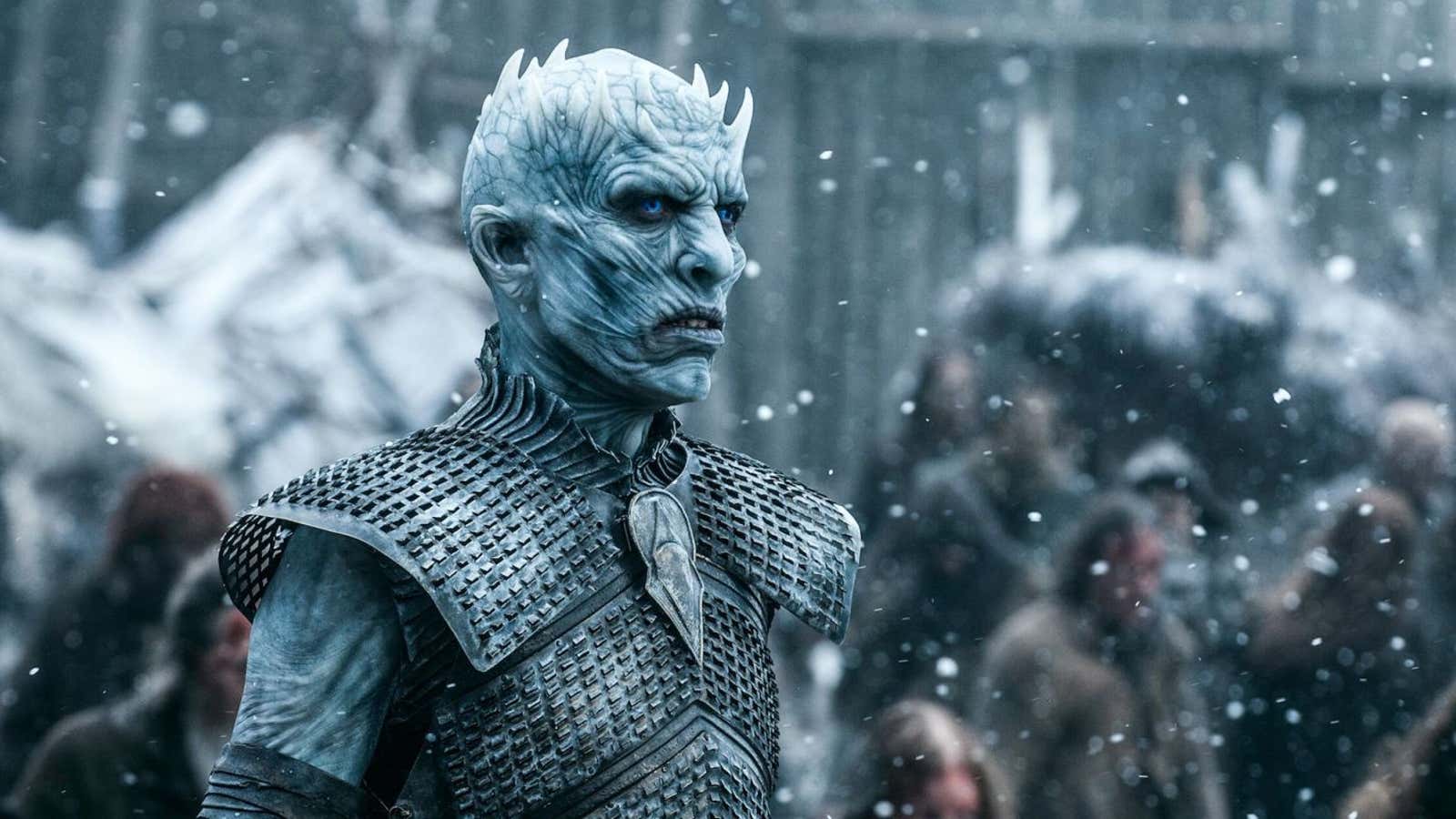This post contains spoilers for many seasons and episodes of Game of Thrones.
The latest episode of Game of Thrones saw the Battle of Winterfell come and go, and while the breathless (slightly too-dark) battle sequences in “The Long Night” gave the Lord of the Rings’ Helm’s Deep a run for its money, viewers who were ready for this fantasy story’s main fantasy plot line to have some kind of payout—after nearly a decade of build-up—may have left feeling a little bit mystified.
We’re referring to, of course, the hasty farewell we bid to the Night King and his ilk following an awesome but totally unsatisfying stab to the gut, courtesy of Arya Stark. The move quickly eliminated enemy number one, cementing Cersei Lannister as our chief villain and revealing that the Night King, aka “Death, Embodied” had just been a big, blue, icy MacGuffin all along (that is, a device with little narrative value other than to drive plot).
The White Walkers’ storyline was introduced in the very first episode of the series. They’re an 8,000-year-old enemy of humankind with a giant, geographic landmark to remind us that while the petty the squabbles playing out across Westeros make for good television, an adversary greater and more terrible loomed ever larger. It’s a storyline that was painstakingly developed alongside an extremely dull Bran Stark’s transformation into the mystical Three-Eyed Raven for another seven seasons (always in a plodding, ambiguous way) but with just enough mystery to keep viewers interested.
The Night King’s intentions were finally—finally!—revealed in episode two of the final season, when Bran informs the assembled Winterfell warriors that what the Night King really wants is “an endless night.” “He wants to erase this world,” Bran explains, “and I am its memory,” he says, having noted that the Night King’s first priority is destroying humankind, meaning the demise of our moody young seer.
While this revelation of the Night King’s one dimensional-villainy was a bit disappointing, Bran’s selective information sharing left viewers with some hope that there might be a bit more to his story (after all, what’s with that symbol the King leaves everywhere? Why hasn’t he killed Jon Snow yet? How is his dark history influencing his current agenda? O, Night King, what delicious secrets are you keeping?)
Alas, it seems we will never know. His death (and the ensuing death of his entire undead army, another Tolkien trope conveniently introduced last season, perhaps as a way for showrunners to get rid of the zombie riff-raff as efficiently as possible) killed the main supernatural plot line of Game of Thrones in one fell swoop.
To be fair, the story’s focus has always been, forgive us, on the game of thrones. As Joanna Robinson explained in Vanity Fair, author George R. R. Martin ”has always said he was more interested in the realities of ruling than the victory over the supernatural.”
And while that might be true, the fact of the matter is that Game of Thrones, as conceived by HBO for TV, routinely fails to lean into its high fantasy elements. This complaint was put best by Jason Concepcion and Mallory Rubin, co-hosts of the Ringer podcast Binge Mode, who expressed concern over “the kind of ham-handed way the series has dealt with the fantasy elements, certainly as the show has moved beyond the books—in a way that almost seems like they’re embarrassed of those elements.”
They pointed to the way showrunners treated “the magic parts of this show as [something] to not think about, or really flesh out” noting that elements like Bran’s powers, Arya’s Faceless Men training, Viserion’s flames, and the relationships between Jon and Ghost and Dany and her dragons have been largely glossed over.
Indeed, the show has eschewed fantasy in favor of sex and politicking, which is not a problem, but becomes frustrating when showrunners eagerly engage with GoT’s fantasy for entertainment value, but fail to deliver on a fantasy plot line. This failure was embodied in “The Long Night” when the expeditious decimation of the White Walkers—a complicated enemy reduced to an army of slobbering, Walking Dead-esque zombies—destroyed years of narrative building.
And you know, it’s still good television, and the sentiment that hell is not the dead en masse—but just other people—is a clever one. That said, the Night King could have made for one of the most compelling villains the fantasy genre has ever seen. Instead, he ended up being a mean, mute red herring in a giant story about geopolitics.
